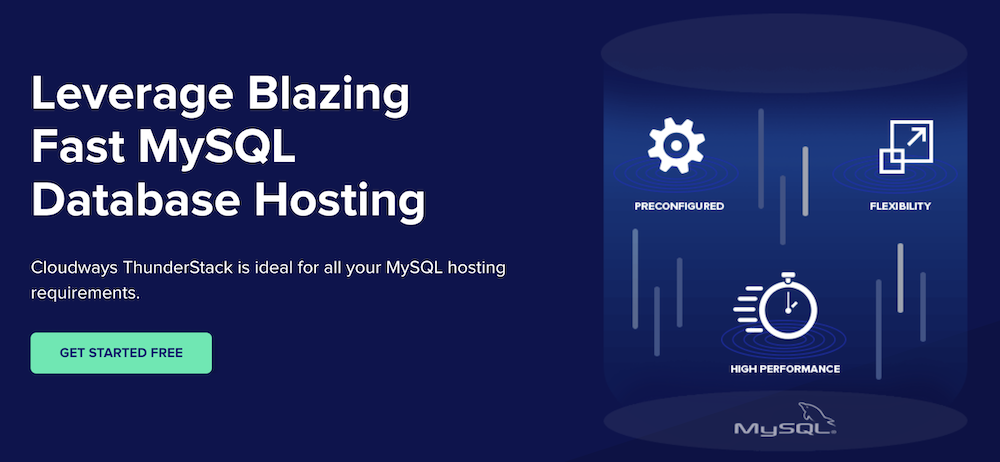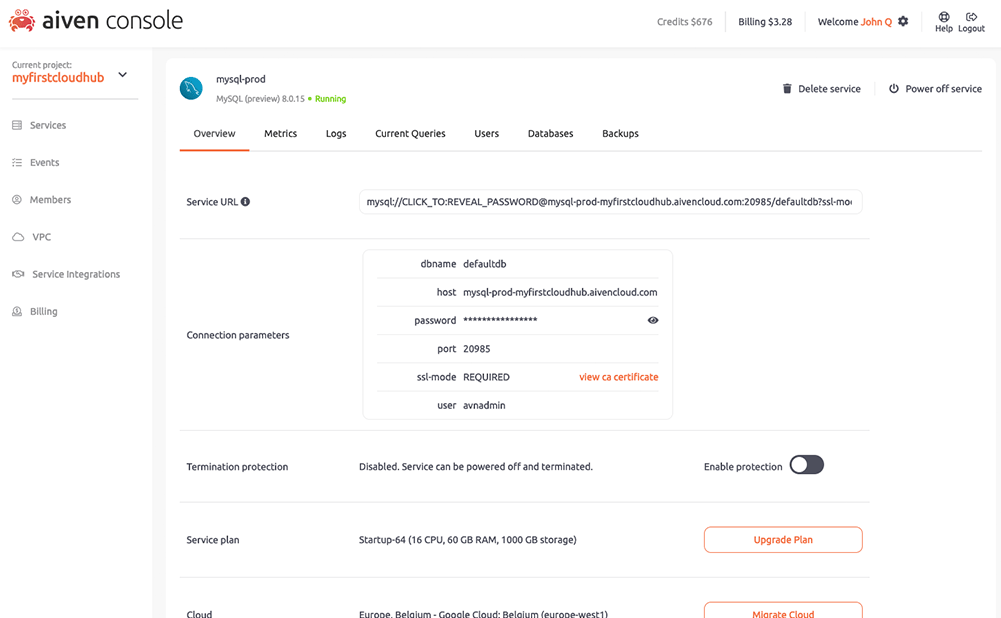Almost every web hosting service provider offers a basic MySQL instance included in its web hosting plans at no extra cost. The web+database hosting combo is a preferred option for new or low-traffic websites since the combo frees the system administrator from all the hassles of managing diverse services. But when data management becomes critical in high-volume applications or websites, it could make sense to decouple both services and keep a dedicated hosting just for the database. DBaaS (database as a service) is also a preferred choice if you are setting up the data layer of an application before knowing how you are going to access that data. Another advantage of having your MySQL installation hosted separately is that you can manage backups, replication, monitoring, and other important features independently from the rest of the hosted services. Also, a managed MySQL platform lets you access it with external tools of your choice, besides the basic tools that the provider offers by default.
Why MySQL?
There are other databases on the cloud that you could use, such as PostgreSQL, MariaDB, Oracle Database, and Microsoft SQL Server. Among them, MySQL stands out for its speed, stability, and ease of use, besides the great convenience of being free and open source. Another important benefit of MySQL is that it is designed for the web from the ground up, unlike other databases that were born for LANs and client-server environments, and were adapted later for the internet. The huge developer community behind MySQL is a guarantee that it will quickly incorporate any new features that users demand. And since those developers are also MySQL users, they make sure that the implementation of those new features is optimized for performance and throughput. That explains how MySQL became a leader in enterprise features such as replication, clustering, and in-memory databases, between others.
What to look for in a managed MySQL hosting platform?
Prices of MySQL hosting services range from nothing to hundreds of dollars a month, depending on the service and volume you need (there are also hourly rates). But there are many other aspects other than the price that you need to take into account when choosing a MySQL service provider, though. The management tools you get with your databases is another important decision factor. DB hosting providers usually offer a management front-end that is usually friendly and easy to use. But it is equally important that you can connect to the database via API calls or remote tools that give you the freedom to access and manage your data at your will. Security is always an important issue to consider when choosing a database hosting. Your database needs to be protected in many ways, including access and data encryption. Since your data will be residing in the cloud, it needs to be encrypted not only when at rest but also when it travels between the database and your application. Finally, you should prefer a service that takes care of as many tasks as possible in terms of routinary management, such as backing up, monitoring, performance optimization, and software updating. Let’s take a look at the best options available in terms of managed MySQL hosting platforms.
Linode
Linode is a tier-one cloud infrastructure company offering the best database services for MySQL, MongoDB, and PostgreSQL. You’re assured of blazing-fast deployment with its cloud manager, API, or CLI. Besides, you can provide selective access by adding specific IP addresses and have its daily backups and simplistic restore for the worst possible cases. The free bundled services like DDoS protection, firewalls, DNS management, IPv6 support, etc., make Linode even more attractive for any high-stakes web project. Additionally, all plans are based on a flexible monthly pricing structure without long-term commitments. Finally, the 99.99% uptime SLA, global data centers, 24/7/365 email & phone support, and the seven-day money-back guarantee makes it an excellent MySQL hosting platform that you shouldn’t miss.
Digital Ocean
Starting at $ 15 a month, Digital Ocean managed databases give you high scalability, daily backups, and automatic failover. With a few clicks, you can launch a MySQL cluster and then use API access or Digital Ocean’s own simplified UI to work with it. You will not have to worry about routine management tasks, because they will all be taken care of. An interesting aspect of the managed service is that the daily backups provide the ability to restore data to any point within the previous seven days. Digital Ocean isolates your databases in your account’s private network, letting you manage communication within your infrastructure. You can still access your data via the public internet, by whitelisting the necessary inbound sources. You don’t have to worry about unauthorized access because your data will be encrypted, both when in transit and at rest.
Kinsta
Kinsta provides cloud hosting services with an infrastructure built on Google Cloud’s Premium Tier network and back up by isolated container technology that allows for complete isolation of the projects’ resources. The hosting provider offers a highly secure, scalable, performance-optimized, and developer-friendly server infrastructure with database services for top databases like MySQL, Redis, MariaDB, and PostgreSQL. Users can set up database hosting with just a few clicks by selecting database type and version, choosing a data center from the 25+ available locations, configuring resources, and then deploying their projects. Internal connections are available with Kinsta’s Application Hosting service, but external connections are also possible.Kinsta’s infrastructure is backed up by enterprise-level Cloudflare integration and 24/7 support. While building and hosting projects on Kinsta’s platform, users are billed only according to the resources they use.
Google Cloud SQL
Google’s service not only offers MySQL databases, but they also give you the choice of PostgreSQL and SQL Server and assure you will be able to connect to your data from any application and from any part of the world, without worrying about backups, replication or failovers. Google promises you’ll get trusted data, high availability, and flexibility, practically without moving a finger. Data access is guaranteed and secured for different cloud platforms, such as App Engine, Compute Engine, Kubernetes, and BigQuery. Data is encrypted in transit and at rest, and you get privacy through a virtual private cloud and network access restricted by a firewall. If in doubt, you can check the security standards covered by Google Cloud SQL: HIPAA, SSAE 16, ISO 27001, and PCI DSS v3.0. With Google Cloud SQL, you don’t have to plan your storage capacity beforehand. You can start for free with a simple testing database with a reduced data set, and then jump to a production environment, using a high-availability database, in no time. Don’t worry about the volume growth as storage will be scaled automatically.
Kamatera
MySQL is one of many managed applications and services offered by Kamatera Cloud. MySQL pricing plans start at $ 4 a month for a service that includes 1 virtual CPU with 1 GB of RAM memory, 20 GB of SSD storage, and 5 TB of internet traffic. A 30-day free trial lets you get a taste of the service, and leave it if you are not satisfied. Kamatera’s data centers are located in America, Europe, Asia, and the Middle East, offering a real global business solution in case you need quick access from any part of the world. Kamatera offers you a choice of MySQL 8.0 or 5.7, both running on a Ubuntu Server 18.04. Guaranteed uptime of 99.95% with no single point of failure grants you continuous operation. You can create a server in as little as 60 seconds, and then scale up and down without limits. A premium, human, 24/7 support service will be there to fulfill any of your needs.
ScaleGrid
ScaleGrid provides the only DBaaS that lets you have full superuser admin control over your MySQL deployments. Using one easy to use management console, you can deploy, provision, monitor, and scale your MySQL clusters in the cloud. “Bring your own cloud” pricing plans start at an $ 8 a month and lets you choose between AWS, AWS High Performance, and Azure. Besides MySQL, you can opt for MongoDB, Redis, or PostgreSQL. The basic plan offers an interesting set of goodies, such as reserved instances support, customizable RAM, disk & instances, automated backups, 24/7 support, dedicated servers, monitoring and custom alerts, slow query analysis, among others. If you enjoy customizing your services and seeing what is going on under the hood, ScaleGrid offers full SSH root access to the underlying machines, letting you explore freely and even install custom software agents. You don’t get locked with ScaleGrid, since you are free to migrate your data at any time, using fully accessible database management tools.
Cloudways
Cloudways designed its ThunderStack MySQL database hosting service with high performance in mind, and it oriented it towards developers by offering a wide range of pre-installed tools such as Git and Composer. Cloudways offers a built-in MySQL administrator that simplifies daily DBA work and an automatic Git deployment feature that allows coordination of work within distributed teams: the code is updated on live servers as soon as it is inserted into remote repositories. Also thought for a developer is Cloudways remote connections feature, which allows for remote, secure connections to the databases hosted on their managed servers. You can start using Cloudways MySQL hosting service for free –they even offer to migrate your first website to Cloudways for free– and later opt for a monthly fee or a pay-as-you-go pricing plan. Different prices apply for different cloud infrastructures. For example, if you use DigitalOcean as your underlying platform, the monthly price (including automated backups, 24/7 support, and many other goodies) is $ 10 for a basic plan. But if you use Google Cloud, the starting price rises to $ 33.30.
SQL Clusters
SQL Clusters offers MySQL hosting on a Kubernetes cloud. The platform is available for MySQL databases at any scale, from experimental developer databases to enterprise production data stores. Pricing plans start at $ 4.99 a month for a service that includes a single node, 2 CPU cores, 2 GB RAM, 60 GB SSD storage, and 60 GB for data backup. Despite being a low-cost service, SQL Clusters offers a fault-tolerant MySQL solution with seamlessly distributed backups and point-in-time restorations.
Aiven
Aiven offers MySQL managed cloud hosting with a selection of infrastructures that includes Google Cloud, AWS, Microsoft Azure, DigitalOcean, and UpCloud, in all regions. To guarantee data security, Aiven’s MySQL instances run on dedicated virtual machines, and the data is encrypted both at rest and in transit. Read-only replicas and remote read replicas offer high speed and free the master node from undemanding reading tasks. Database forking service is an exclusive feature that Aiven offers to let you perform additional actions on your database without affecting the production environment. Monthly pricing plans start at $ 99 for a startup plan, which includes 1 VM, 2 CPUs, 4 GB RAM, and 80 GB of storage.
Stay away from vendor lock-ins
One last thing you need to be sure when you pick a cloud database provider is that it will let you take your databases somewhere else at any moment and without hassles. The cloud service provider that you choose today could not be appropriate tomorrow, or maybe you find another option that offers a better or cheaper service. Therefore, you need to know in advance that you will be able to migrate your data at your will easily.

![]()






























